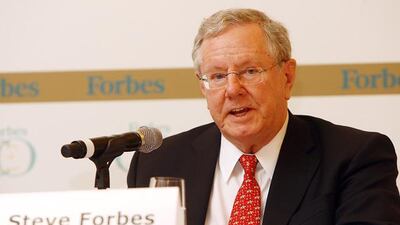Forbes remains committed to printing magazines, despite the surprise move by fellow US title Newsweek to shut down its presses.
Steve Forbes, the editor-in-chief of Forbes and grandson of the publication's founder, said there is still demand for a printed product despite the rise of online media.
"Print still has very much a role to play," said Mr Forbes, who was speaking in Dubai. "Even in the United States, despite what's happened with Newsweek, our paid circulation remains strong."
Newsweek said this month that it would become a digital-only product, and cease production of the printed magazine at the end of 2012.
But Forbes will not immediately follow suit, with its editor-in-chief saying the US version of the magazine will be printed as long as the demand is there.
“Free markets are about meeting the needs and wants of others. And if people want the magazine they will continue to receive it,” said Mr Forbes.
The executive said that print represents a “big chunk” of the group’s income, but added that online revenues sometimes exceeded that of the printed publication on a month-to-month basis.
Mike Perlis, president and chief executive of Forbes, said traffic to Forbes.com was increasing.
“We’ve grown almost double in the last two years, to 35 million unique visitors to the site on a monthly basis,” said Mr Perlis.
“Forbes.com revenues, through the first three quarters of 2012, grew 27 per cent [compared to the same period last year]. So it’s high growth in digital.”
Middle East editions of Forbes are published in English and Arabic under license by the Dubai-based Arab Publisher House.
“The circulation of each is 25,000, so there is a real market,” said Mr Forbes.
An Arabic website supports the titles, and Mr Forbes said an English-language version of Forbes Middle East is in the pipeline.
“We’ll be having a website here in English. So, again the customers will decide how it shapes out,” he said. A representative of Arab Publisher House told The National that the English-language site is set to launch in the next few months.
Mr Forbes was speaking on the opening day of the Forbes Global CEO Conference, which is being held in Dubai.
Sheikh Mohammed, Vice President of the UAE and Ruler of Dubai, was confirmed as the keynote speaker at the event.
Other attendees include the Saudi Arabian billionaire Prince Alwaleed bin Talal, and Mohammed Al Shaibani, the director general of the Ruler's Court, and chief executive of the Investment Corporation of Dubai.
Mr Forbes - who has twice run as a candidate for the Republican Party's nomination for president - has openly supported Mitt Romney's campaign for the White House.
He said he agreed with the presidential candidate's assertion that state funding of broadcasters like PBS - which itself supports the distribution of the Sesame Street show - should be scrapped.
“I think the point Romney made was that - at a time when we’ve got very serious financial problems - PBS is quite capable of standing on its own,” said Mr Forbes.
“We have multiplicity of media in the United States - literally thousands of channels. The Web is infinite. So why should working people forcibly have their money taken to support something that can support itself?”
Mr Forbes said the situation in the UAE - which has zero income tax - compares favourably with the regime in his native United States.
“I believe in the flat tax - a single rate,” he said. “You’re not going to get rid of the income tax. But if you don’t have it don’t bring it in. We made that mistake 100 years ago, so there’s no going back on it.”

